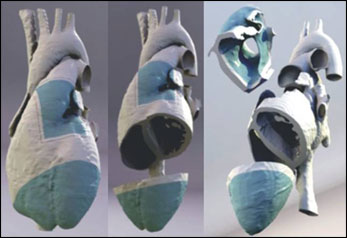
Photo courtesy of ValveXchange |
Patient-specific heart models such as this one will improve development of ValveXchange's artificial heart valve.
|
ValveXchange Inc., an Aurora company, recently reached a license agreement with the University of Colorado for a process to transform cardiac imaging data into high-quality, three-dimensional models used for heart valve product development, clinician training and pre-procedure planning.
The CU technology converts data from routine medical imaging of soft tissues (ultrasounds and CT and MRI scans) into 3-D models, which are then transformed into physical models using 3-D printers. ValveXchange will use the technology in conjunction with its implantable heart valve program. ValveXchange is developing a novel artificial heart valve that has all the advantages of today's tissue-based heart valves, but can be implanted and replaced through a small incision between the ribs. This approach is expected to replace traditional open-heart surgery for many heart valve procedures.
The licensed 3-D heart modeling technology offers the opportunity to develop the valve technology using patient-specific heart anatomy examples, and later to train physicians in implant techniques in a realistic manner. Improved valve designs coupled with more advanced clinician training and patient-specific procedure planning are expected to significantly improve both treatment and quality of life of patients requiring these implants.
"We expect this advance in 3-D heart modeling to provide ValveXchange with a real advantage in the market space," said ValveXchange CEO Larry Blankenship. "By being able to work with a model of the specific patient's heart before the heart valve replacement procedure, physicians are expected to be able to decrease procedure time and increase success rates. This will be one more reason for them to select the advanced heart valve technology being developed by ValveXchange."
Paul Tabor of the CU Technology Transfer Office said the models provide a powerful tool for procedure planning and physician and patient education.
"We are hopeful the marriage of these technologies results in a leap forward in the design, testing and performance of implantable heart valves," Tabor said.
The licensed technology is based on the work of Adam Hansgen, John D. Carroll, Shiuh-Yung (James) Chen and Michael Kim, all in the University of Colorado School of Medicine's department of cardiology.
ValveXchange recently was notified of a grant award of $250,000 to develop this technology under Colorado's Early Stage Bioscience Company Grant Program, one of several funding initiatives created by the state in 2008 to accelerate the commercialization of bioscience technologies developed at the state's research institutions. This state funding is matched by research funding from the National Institutes of Health (NIH).
"Matching funds from the state are critical to filling in the funding gaps that invariably arise when rapidly moving technology companies rely on a centralized funding system designed to support basic research with typically a five-year time horizon," noted Dr. Ivan Vesely, a Ph.D. biophysicist, NIH-funded scientist and founder of ValveXchange.
The CU Technology Transfer Office (TTO) pursues, protects, packages, and licenses to business the intellectual property generated from research at CU. The TTO provides assistance to faculty, staff and students, as well as to businesses looking to license or invest in CU technology. For more information about technology transfer at CU, click here.
|